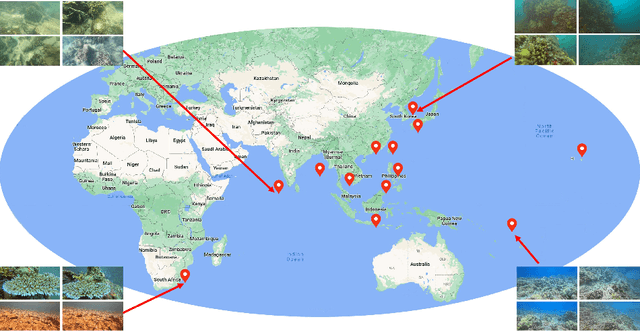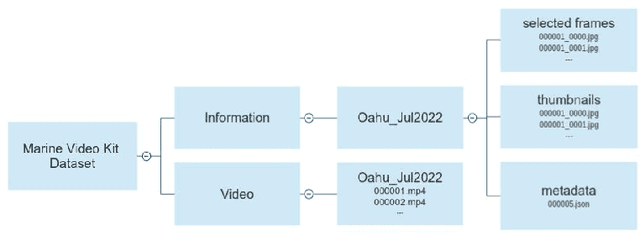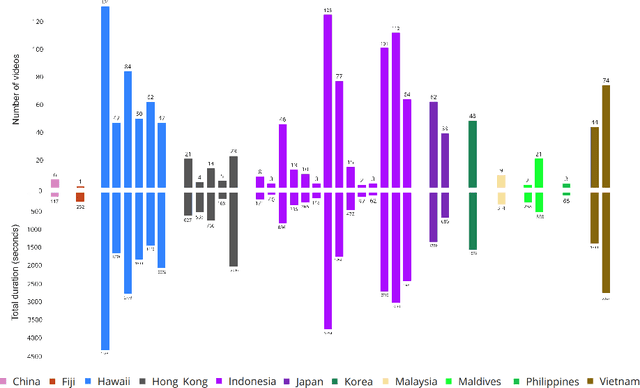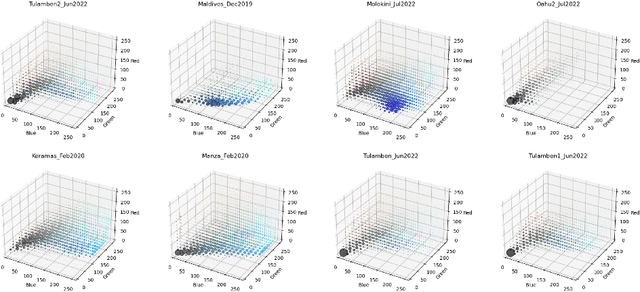Tan-Sang Ha
The 2nd Workshop on Maritime Computer Vision 2024
Nov 23, 2023



Abstract:The 2nd Workshop on Maritime Computer Vision (MaCVi) 2024 addresses maritime computer vision for Unmanned Aerial Vehicles (UAV) and Unmanned Surface Vehicles (USV). Three challenges categories are considered: (i) UAV-based Maritime Object Tracking with Re-identification, (ii) USV-based Maritime Obstacle Segmentation and Detection, (iii) USV-based Maritime Boat Tracking. The USV-based Maritime Obstacle Segmentation and Detection features three sub-challenges, including a new embedded challenge addressing efficicent inference on real-world embedded devices. This report offers a comprehensive overview of the findings from the challenges. We provide both statistical and qualitative analyses, evaluating trends from over 195 submissions. All datasets, evaluation code, and the leaderboard are available to the public at https://macvi.org/workshop/macvi24.
UWA360CAM: A 360$^{\circ}$ 24/7 Real-Time Streaming Camera System for Underwater Applications
Sep 30, 2023



Abstract:Omnidirectional camera is a cost-effective and information-rich sensor highly suitable for many marine applications and the ocean scientific community, encompassing several domains such as augmented reality, mapping, motion estimation, visual surveillance, and simultaneous localization and mapping. However, designing and constructing such a high-quality 360$^{\circ}$ real-time streaming camera system for underwater applications is a challenging problem due to the technical complexity in several aspects including sensor resolution, wide field of view, power supply, optical design, system calibration, and overheating management. This paper presents a novel and comprehensive system that addresses the complexities associated with the design, construction, and implementation of a fully functional 360$^{\circ}$ real-time streaming camera system specifically tailored for underwater environments. Our proposed system, UWA360CAM, can stream video in real time, operate in 24/7, and capture 360$^{\circ}$ underwater panorama images. Notably, our work is the pioneering effort in providing a detailed and replicable account of this system. The experiments provide a comprehensive analysis of our proposed system.
MarineVRS: Marine Video Retrieval System with Explainability via Semantic Understanding
Jun 07, 2023



Abstract:Building a video retrieval system that is robust and reliable, especially for the marine environment, is a challenging task due to several factors such as dealing with massive amounts of dense and repetitive data, occlusion, blurriness, low lighting conditions, and abstract queries. To address these challenges, we present MarineVRS, a novel and flexible video retrieval system designed explicitly for the marine domain. MarineVRS integrates state-of-the-art methods for visual and linguistic object representation to enable efficient and accurate search and analysis of vast volumes of underwater video data. In addition, unlike the conventional video retrieval system, which only permits users to index a collection of images or videos and search using a free-form natural language sentence, our retrieval system includes an additional Explainability module that outputs the segmentation masks of the objects that the input query referred to. This feature allows users to identify and isolate specific objects in the video footage, leading to more detailed analysis and understanding of their behavior and movements. Finally, with its adaptability, explainability, accuracy, and scalability, MarineVRS is a powerful tool for marine researchers and scientists to efficiently and accurately process vast amounts of data and gain deeper insights into the behavior and movements of marine species.
Marine Video Kit: A New Marine Video Dataset for Content-based Analysis and Retrieval
Sep 23, 2022



Abstract:Effective analysis of unusual domain specific video collections represents an important practical problem, where state-of-the-art general purpose models still face limitations. Hence, it is desirable to design benchmark datasets that challenge novel powerful models for specific domains with additional constraints. It is important to remember that domain specific data may be noisier (e.g., endoscopic or underwater videos) and often require more experienced users for effective search. In this paper, we focus on single-shot videos taken from moving cameras in underwater environments which constitute a nontrivial challenge for research purposes. The first shard of a new Marine Video Kit dataset is presented to serve for video retrieval and other computer vision challenges. In addition to basic meta-data statistics, we present several insights and reference graphs based on low-level features as well as semantic annotations of selected keyframes. The analysis contains also experiments showing limitations of respected general purpose models for retrieval.
 Add to Chrome
Add to Chrome Add to Firefox
Add to Firefox Add to Edge
Add to Edge